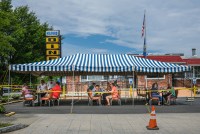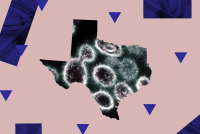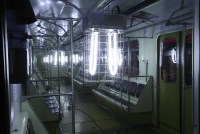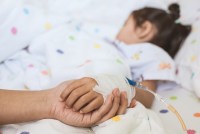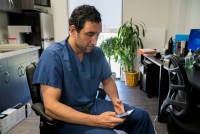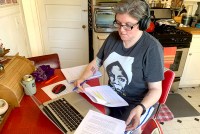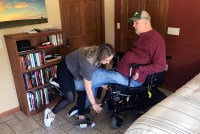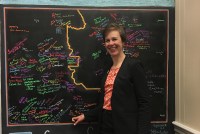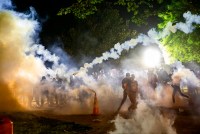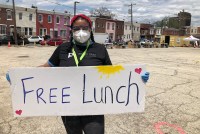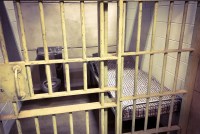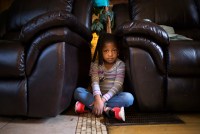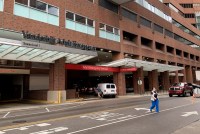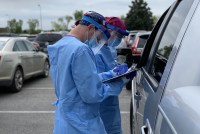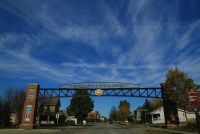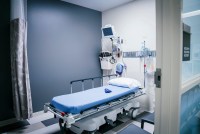Latest Morning Briefing Stories
When Green Means Stop: How Safety Messages Got So Muddled
Philadelphia is in the “restricted green” reopening phase. What does that mean? And why does the U.S. have so many different pandemic safety rules?
In Texas, More People Are Losing Their Health Insurance as COVID Cases Climb
During the pandemic, nearly 700,000 additional Texans have lost health insurance. The Lone Star State already had more uninsured people than any other. It has given people with COVID symptoms pause before seeking medical care.
Scientists Want to Know More About Using UV Light to Fight COVID-19 Spread
‘Germicidal’ ultraviolet light technology has a proven track record against indoor transmission of tuberculosis and other airborne microbes. It’s now being used in some restaurants and on subways.
Why Doctors Keep Monitoring Kids Who Recover From Mysterious COVID-Linked Illness
About 1,000 children worldwide have had the condition known as MIS-C — Multisymptom Inflammatory Syndrome in Children. Children’s hospitals around the U.S. are trying to keep tabs on young people after they recover from the ailment, to gauge any long-term effects.
Cities Brace For ‘Collision Course’ Of Heat Waves And COVID-19
Rochester, New York, and other cities have already weathered the first blasts of excessive heat, and they have done it while cooling centers and spray parks have been closed due to the pandemic.
Drinking Surged During The Pandemic. Do You Know The Signs Of Addiction?
Experts say a bit of extra drinking isn’t a problem for many people, but they recommend watching out for specific behaviors that signal addiction.
Injured And Uninsured, Protesters Get Medical Aid From LA Doctor
A Los Angeles ophthalmologist’s offer on Instagram has ballooned into a loose network of physicians providing medical care to protesters who were injured while rallying against police brutality and racism. While clashes with the police have died down in some parts of the country, some protesters are seeking care for festering wounds from days-old injuries.
California Hits Up Libraries and Tax Offices To Recruit 20,000 New Disease Detectives
As California begins one of the largest contact-tracing training programs in the country, many of the new recruits will be librarians: who are known to be curious, tech-savvy and really good at getting people they barely know to open up.
Pandemic Upends The Lives Of People With Disabilities — And Of Their Caregivers
Wisconsin already faced a shortage of caregivers who offer crucial health services and independence to their clients. Then the pandemic struck. In a survey of nearly 500 Wisconsinites with disabilities and older adults, every respondent said the pandemic had disrupted their caregiving service.
Public Health Officials Face Wave Of Threats, Pressure Amid Coronavirus Response
Public health officials are confronting growing pressure — and threats — across the country as the backlash to the coronavirus response continues. At least 27 state and local health leaders have resigned, retired or been fired since April across 13 states.
Tear-Gassing Protesters During An Infectious Outbreak ‘A Recipe For Disaster’
Health researchers are among the voices calling for police to stop using tear gas and pepper spray on protesters, because these chemical irritants can damage the body in ways that can spread the coronavirus and increase the severity of COVID-19. One example: Tear gas and pepper spray can sow confusion and panic in a crowd, causing people to rip off their masks and touch their faces, leading to more contamination.
Pandemic Presents New Hurdles, And Hope, For People Struggling With Addiction
Relaxed regulations in response to the pandemic means more access to addiction treatment medications. But recovery programs are accepting fewer people, and the danger of overdose remains high.
As COVID Cuts Deadly Path Through Indiana Prisons, Inmates Say Symptoms Ignored
Since the start of the pandemic, prisoners and their families have contradicted state officials about the conditions inside Indiana prisons. Many inmates report they’ve had no way to protect themselves from close contact with other inmates and staff members. They believe contracting the coronavirus is inevitable.
Searching For Safety: Where Children Hide When Gunfire Is All Too Common
The overall crime rate has dropped during the pandemic, but unfortunately gun violence has not. In St. Louis, at least 11 children have been killed by gunfire so far this year. Living in neighborhoods with frequent violence has forced some families to improvise ways to keep their children safe, even in the place they are supposed to be most secure: their home. The stress of growing up in these conditions could lead to chronic health problems into adulthood.
Congress Said COVID-19 Tests Should Be Free — But Who’s Paying?
Some large employers interpreted themselves as exempt from new federal laws that say tests for the coronavirus should be free to patients. Large academic medical centers are holding back from sending bills to these patients to avoid a backlash over surprise billing.
Tennessee’s Secret To Plentiful Coronavirus Testing? Picking Up The Tab
Just about anyone who wants a coronavirus test in the state of Tennessee can get one. How? The state got buy-in and lots of participation from private labs by assuring them it will pay them.
To Stem COVID, This Small Indiana City Decided To Test All Public-Facing Employees
An affluent suburb looked to Iceland’s and South Korea’s widespread testing in an effort to slow the spread of the coronavirus. The method is pricey, but leaders are convinced it is worthwhile.
Fewer Traffic Collisions During Shutdown Means Longer Waits For Organ Donations
Accident deaths are typically the biggest source of donor organs nationwide. But when the coronavirus forced Californians indoors, accidents declined.
In Reversal, Kansas Will Count All Positive COVID Cases, Even Asymptomatic Ones
Following a KCUR report, Kansas officials said the state’s public reporting of pandemic trends will count all tests that come back positive for the new coronavirus, even when the patient has no symptoms.
Eerie Emptiness Of ERs Worries Doctors As Heart Attack And Stroke Patients Delay Care
Emergency department volumes are down 40 to 50 percent across the country. Doctors worry a new wave of cardiac patients is headed their way — people who have delayed care and will be sicker and more injured when they finally seek care.



